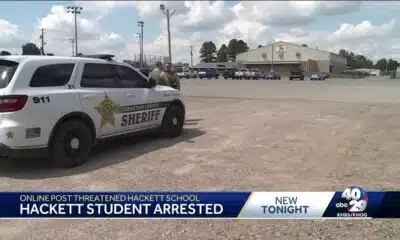News from the South - Arkansas News Feed
Arkansas Senate advances two stalled bills that would change citizen-led ballot initiative process
Arkansas Senate advances two stalled bills that would change citizen-led ballot initiative process
by Tess Vrbin, Arkansas Advocate
February 26, 2025
In a reversal, the Arkansas Senate allowed two proposed changes to the state’s citizen-led ballot measure process to advance to the House on Tuesday after failing to pass the bills’ emergency clauses earlier this month.
Sen. Kim Hammer, R-Benton, is sponsoring a slew of legislation he has said would deter fraudulent behavior and protect the integrity of the signature collection process for proposed ballot measures.
Opponents of the bills have called them a threat to the public’s right to change laws and the state Constitution, which fewer than half of states allow, according to the National Conference of State Legislatures.
Hammer announced in January that he will run next year for Secretary of State, the executive branch office that oversees elections.
Most of the bills he is sponsoring have emergency clauses, which would allow them to go into effect immediately upon Gov. Sarah Huckabee Sanders’ signature. Emergency clauses require a two-thirds vote of at least 24 senators and at least 67 House members.
The emergency clauses on Senate Bills 209 and 210 each received 24 votes Tuesday without any debate on the proposed laws themselves. The bills initially received 21 and 22 votes, respectively, on Feb. 12, and the emergency clauses again failed to reach 24 votes the following day.
Senate Bill 209 would disqualify signatures collected by canvassers if the secretary of state finds “by a preponderance of evidence” that they violated state law collecting the signatures.
Senate Bill 210 would require potential signers to read the ballot title of a petition or have it read aloud to them in the presence of a canvasser. It would also make it a misdemeanor for a canvasser to accept a signature from people who have not read the ballot title or had it read aloud to them in the presence of a canvasser.
Republican Sens. Jimmy Hickey of Texarkana, Clint Penzo of Springdale and Gary Stubblefield of Branch voted against both emergency clauses Tuesday. Sen. Bryan King, R-Green Forest, did not vote on either emergency clause. All four voted against the bills Feb. 12.
Sen. Tyler Dees, R-Siloam Springs, voted against SB 209 and for SB 210 on Feb. 12. He voted for both emergency clauses Feb. 13 and Tuesday.
Sen. Jim Petty, R-Van Buren, was absent Feb. 12 and did not vote on the emergency clauses Feb. 13. He voted for both emergency clauses Tuesday. Sen. Joshua Bryant, R-Rogers, was also absent Feb. 12 but voted for the emergency clauses twice.
All six Senate Democrats opposed SB 209 and SB 210.
The House Committee on State Agencies and Governmental Affairs will be next to hear the bills.
Amendments in committee
Hammer introduced a total of six bills earlier this month that would alter the ballot initiative petition process. Senate Bill 212 would create a law enforcement agency within the secretary of state’s office that could investigate the validity of submitted documents related to elections and ballot initiatives.
The bill failed in the Senate State Agencies Committee on Feb. 11. Hammer amended the bill and will present it to the committee again Thursday.
The Senate will vote Wednesday on another of Hammer’s bills, Senate Bill 207, which would require canvassers for ballot-measure petitions to inform potential signers that petition fraud is a criminal offense. The section of Arkansas code governing initiatives and referenda designates petition fraud a Class A misdemeanor.
Another section of Arkansas code designates petition fraud a Class D felony, which lawmakers pointed out during a Feb. 17 House State Agencies Committee hearing. House sponsor Rep. Kendon Underwood, R-Cave Springs, amended the bill to avoid confusion between the two statutes.
On Tuesday, the Senate State Agencies Committee voted to concur on the amendment to SB 207 and send it to the Senate floor.
Carol Egan, the only member of the public who testified in Tuesday’s committee meeting, said she opposed the bill because it would discourage participation in the ballot initiative process. She also questioned how it would be proven that someone violated the proposed law, noting that people opposed to a particular measure could derail it by saying that the canvasser hadn’t notified them that petition fraud is a criminal offense.
“I think this needs to be thought out a lot better, and I’m not even sure that it’s necessary,” Egan said.
The broadness of the term “criminal offense” allows prosecutors to apply a punishment appropriate to the crime, Hammer said.
“The applicable offense would be applied based on the severity of what they determined the person was doing,” he said. “So I think there’s a little bit of reason to keep it at the criminal offense level instead of making it something as harsh as a felony or as light as a misdemeanor.”
SB 207 passed the House Monday with 67 votes, the minimum required to pass the emergency clause. Seventeen of the 19 House Democrats, as well as nine Republicans, voted against SB 207.
GET THE MORNING HEADLINES.
House action and new laws
Two more of Hammer and Underwood’s ballot initiative bills passed the House Tuesday, with one needing a second vote to pass the emergency clause.
Senate Bill 208 would require canvassers to request a photo ID from potential signers, and Senate Bill 211 would require canvassers to file a “true affidavit” with the secretary of state certifying they complied with the Arkansas Constitution and state laws related to canvassing, perjury, forgery and fraudulent practices in the procurement of petition signatures. Signatures submitted without the affidavit would not be counted.
Both bills passed the House State Agencies Committee twice on split voice votes. The committee heard nearly six hours of public testimony, mostly in opposition, before passing the bills Feb. 17 but needed to pass them again Monday after they were amended.
SB 208 received 70 votes for and 24 votes against it after no debate on the House floor. Four House members did not vote and two voted present.
SB 211 received 65 votes for and 27 against, with five members not voting and three voting present.
All 19 House Democrats voted against SB 211. House Minority Leader Andrew Collins, D-Little Rock, was the only lawmaker to comment on the bill before the vote.
Collins pointed out that state law already requires ballot question committees to submit an affidavit identifying paid canvassers by name and provide proof that the committee explained to canvassers the state’s laws for soliciting signatures and gave them the Secretary of State’s initiatives and referenda handbook before they started canvassing.
He also said the possible disqualification of all signatures collected by the same person would disincentivize people from signing petitions in case the canvasser did not sign the additional affidavit.
“They may not have done anything wrong when it comes to getting your signature — your signature may be perfectly valid — but it’ll be thrown out if this bill passes if the canvasser has any issue, even [on] a technicality,” Collins said. “…Of all of the bills, this one really warrants a closer look because what we’re doing here is going to chill direct democracy, and the people’s voice matters in Arkansas.”
The emergency clause on SB 211 received 69 votes. Democratic Rep. Jessie McGruder of Marion switched his vote from no to yes, and Republican Reps. Rick McClure of Malvern and Ron McNair of Alpena switched their votes from present to yes.
Rep. Cindy Crawford, R-Fort Smith, did not vote on the bill and voted for the emergency clause. Rep. Cameron Cooper, R-Romance, voted present on both.
Also on Tuesday, Sanders signed two other bills co-sponsored by Hammer that alter the ballot initiative process:
Act 153 clarifies that the certification of ballot titles for initiatives, referenda and constitutional amendments as well as the signatures collected for those measures would only be valid for the next general election.Act 154 will expand the attorney general’s existing authority to reject a proposal if it conflicts with the U.S. Constitution or federal statutes. It will also prevent a sponsor from submitting more than one conflicting petition at the same time.
Act 153 has an emergency clause while Act 154 does not. Both bills went to Sanders’ desk last week.
YOU MAKE OUR WORK POSSIBLE.
Deputy Editor Antoinette Grajeda contributed to this article.
Arkansas Advocate is part of States Newsroom, a nonprofit news network supported by grants and a coalition of donors as a 501c(3) public charity. Arkansas Advocate maintains editorial independence. Contact Editor Sonny Albarado for questions: info@arkansasadvocate.com.
The post Arkansas Senate advances two stalled bills that would change citizen-led ballot initiative process appeared first on arkansasadvocate.com
News from the South - Arkansas News Feed
Hackett student arrested after shooting threat
SUMMARY: A Hackett student was arrested after an anonymous shooting threat targeting the high school was posted in a student group chat. The threat, reported Monday morning, prompted Sebastian County deputies to station officers at Hackett schools for safety as classes resumed. Deputies, aided by Homeland Security, traced the post back to the teenager within ten hours. Investigators say there is no credible evidence the student intended to carry out the threat. The situation escalated through social media, complicating tracing efforts. The investigation remains active, with possible additional arrests, and deputies will continue a visible presence at the schools.
Deputies increased security at Hackett schools in response.
Subscribe to 40/29 on YouTube now for more: http://bit.ly/PTElbK
Get more Northwest Arkansas news: http://www.4029tv.com
Like us: http://facebook.com/4029news
Follow us: http://twitter.com/4029news
Instagram: https://www.instagram.com/4029news/
News from the South - Arkansas News Feed
Every fall there’s a government shutdown warning. This time it could happen.
by Jennifer Shutt, Arkansas Advocate
September 2, 2025
WASHINGTON — Congress returns to Washington, D.C., this week following an uneventful August recess where little to no progress was made on government funding, even though lawmakers have just weeks left until their shutdown deadline.
Republican leaders will need the support of several Democratic senators to approve a stopgap spending bill before Oct. 1, since lawmakers have once again failed to complete the dozen full-year bills on time.
But what was once a routine bipartisan exercise has taken on heightened stakes, with Democrats and some Republicans increasingly frustrated by the Trump administration’s unilateral spending decisions.
The nonpartisan Government Accountability Office has issued several reports faulting the Trump administration for impounding, or refusing to spend funds approved by Congress, in violation of the law. And dozens of lawsuits have been filed, alleging the administration has acted to supersede Congress’ power of the purse.
The ongoing tension, combined with party leaders’ increasing focus on next year’s midterm elections, makes the possibility of a shutdown higher than it has been for years.
President Donald Trump said in mid-August he was open to meeting with Democratic leaders once they were back in town to negotiate a government funding deal but minimized the importance of talks.
“Well, I will, I guess, but it’s almost a waste of time to meet because they never approve anything,” Trump said.
Senate Democratic Leader Chuck Schumer and House Democratic Leader Hakeem Jeffries released a letter last week urging Speaker Mike Johnson and Senate Majority Leader John Thune to quickly begin negotiating a bipartisan stopgap bill.
“The government funding issue must be resolved in a bipartisan way,” they wrote. “That is the only viable path forward.”
Senate Appropriations Chairwoman Susan Collins, R-Maine, said last week that she wants to keep advancing the full-year spending bills, but that a short-term stopgap would be necessary to give lawmakers enough time.
“We need to avoid a government shutdown, which would be horrendous if that were to occur on October 1,” Collins said, according to remarks provided by her office. “And we also need to avoid having a continuing resolution, by that I mean a stopgap bill that just puts government on automatic pilot for the whole year.
“We’re going to have to have a short-term continuing resolution, but we’re making really good progress with overwhelming bipartisan support, and I hope that will continue.”
Another failure
Congress is supposed to complete work on the dozen annual appropriations bills before the start of the new fiscal year but has failed to do so for decades. This year is no different.
The House and Senate are nowhere near finishing their work on the bills, which provide funding for dozens of departments, including Agriculture, Defense, Education, Energy, Health and Human Services, Homeland Security, Housing and Urban Development, Interior, Justice, State, Transportation and Veterans Affairs.
The bills, which make up about one-third of federal spending, also fund smaller agencies like the National Oceanic and Atmospheric Administration, National Science Foundation and the National Weather Service.
The House has approved two of the dozen bills — Defense and Military Construction-VA. The Senate has passed its Agriculture, Legislative Branch and Military Construction-VA bills.
The House bills have only been supported by GOP lawmakers, while the Senate’s bills are broadly bipartisan, giving that chamber an upper hand if the two chambers begin conferencing full-year bills later this year.
Without a bipartisan, bicameral agreement on how much to spend on all of the bills, it’s highly unlikely Congress will be able to complete its work before the Oct. 1 deadline.
U.S. Senate Majority Leader John Thune, R-South Dakota, speaks at a Greater Sioux Falls Chamber of Commerce Inside Washington luncheon on Aug. 12, 2025. (Photo by Makenzie Huber/South Dakota Searchlight)
Leaders will instead need to reach agreement on a stopgap spending bill that essentially keeps government funding on autopilot until lawmakers can work out a final deal on the full-year bills.
The calendar doesn’t give Speaker Johnson, R-La., and Senate Majority Leader Thune, R-S.D., much time to find compromise with their Democratic counterparts.
Both chambers are in session for three weeks at the beginning of September before breaking for Rosh Hashanah. They’ll return to Capitol Hill on Sept. 29 with less than two days to fund the government or begin a partial shutdown.
Thune said in mid-August at the Greater Sioux Falls Chamber of Commerce Inside Washington luncheon that he expects lawmakers will “have a big fight at the end of September.”
Last shutdown stretched 35 days
It’s been almost seven years since some federal departments and agencies had to navigate a shutdown, when Congress and the first Trump administration were unable to broker a funding deal before a deadline.
A shutdown this year would have substantially more impact than that 35-day debacle since, when that funding lapse began, Congress had approved the Defense, Energy-Water, Labor-HHS-Education, Legislative Branch and Military Construction-VA spending bills.
The departments and agencies funded by those laws, including Congress, weren’t affected by the shutdown.
Lawmakers have failed to send any of the full-year bills to Trump so far this year, so every department and agency would need to implement a shutdown plan if Congress doesn’t approve a stopgap spending bill before Oct. 1.
Federal employees who deal with the preservation of life and property as well as national security will likely be deemed exempt and work without pay until the shutdown ends.
Workers who are not considered essential to the federal government’s operations would be furloughed until Congress and the president broker some sort of funding deal.
Both categories of employees receive back pay once the lapse ends, though that doesn’t extend to federal contractors.
On to the stopgap
Congress regularly approves a stopgap spending bill in September to gain more time to complete negotiations on the full-year appropriations bills.
That continuing resolution, as it’s sometimes called, usually lasts until the last Friday in December when both chambers of Congress are scheduled to be in Washington, D.C.
So a September stopgap would likely last until Friday, Dec. 19, assuming the House and Senate can reach an agreement and hold floor votes in the weeks ahead.
Last year, in the lead-up to the presidential election, lawmakers approved a stopgap bill in September that funded the government through mid-December.
Following the Republican sweep of the November elections, GOP leaders opted not to negotiate the full-year bills and used a second stopgap bill to fund the government until March after a raucous 48 hours on Capitol Hill.
Speaker Johnson took a go-it-alone approach on a third stopgap spending bill, leaving Democrats completely out of the negotiations and jamming the Senate with the legislation.
Schumer and several Democrats ultimately helped Republicans get past the 60-vote legislative filibuster, but most voted against actually passing the stopgap.
The dilemma over forcing a shutdown or helping Republicans pass a stopgap bill will resurface for Schumer in the weeks ahead as he tries to navigate another shutdown deadline amid unified GOP control of Washington.
Arkansas Advocate is part of States Newsroom, a nonprofit news network supported by grants and a coalition of donors as a 501c(3) public charity. Arkansas Advocate maintains editorial independence. Contact Editor Sonny Albarado for questions: info@arkansasadvocate.com.
The post Every fall there’s a government shutdown warning. This time it could happen. appeared first on arkansasadvocate.com
Note: The following A.I. based commentary is not part of the original article, reproduced above, but is offered in the hopes that it will promote greater media literacy and critical thinking, by making any potential bias more visible to the reader –Staff Editor.
Political Bias Rating: Centrist
This content presents a balanced overview of the government shutdown situation, highlighting perspectives and actions from both Republican and Democratic leaders without overtly favoring either side. It includes factual reporting on legislative processes, quotes from key political figures across the aisle, and references to nonpartisan sources, maintaining a neutral tone throughout. The article focuses on the procedural and political challenges without editorializing, reflecting a centrist approach to the topic.
News from the South - Arkansas News Feed
Arkansas Fall forecast: Warmer temperatures and drier conditions expected as drought persists
SUMMARY: Arkansas is expected to experience a cooler and more fall-like September, starting meteorological fall on September 1st. The last week of August was among the coolest on record, and early September will continue with below-average temperatures. A cold front later next week will bring further cooling, making the second weekend of football season comfortable. Mid-September temperatures will remain fairly mild, with highs dropping from mid-80s to mid-70s in Northwest Arkansas and from low 90s to low 80s in the River Valley by month’s end. Fall colors should appear earlier than last year, likely peaking from late October to early November.
The Climate Prediction Center released its outlook for Fall, which shows above-average temperatures continuing through November.
Subscribe to 40/29 on YouTube now for more: http://bit.ly/PTElbK
Get more Northwest Arkansas news: http://www.4029tv.com
Like us: http://facebook.com/4029news
Follow us: http://twitter.com/4029news
Instagram: https://www.instagram.com/4029news/
-
Mississippi Today3 days ago
DEI, campus culture wars spark early battle between likely GOP rivals for governor in Mississippi
-
Mississippi Today7 days ago
Judge: Felony disenfranchisement a factor in ruling on Mississippi Supreme Court districts
-
News from the South - North Carolina News Feed5 days ago
Parasocial party: Why people are excited for the Taylor Swift, Travis Kelce engagement
-
News from the South - Louisiana News Feed6 days ago
K+20: Katrina alters local health care landscape, though underlying ills still the same
-
Our Mississippi Home6 days ago
The Great Backyard Recovery – Helping Birds After the Storm
-
The Center Square6 days ago
U-M Health ends transgender treatment for minors | Michigan
-
Local News Video4 days ago
08/29 Ryan's “Wet End to the Week” Friday Forecast
-
News from the South - Florida News Feed6 days ago
Man who shot ex-girlfriend died after shootout with deputies at apartment complex, MDSO says











































